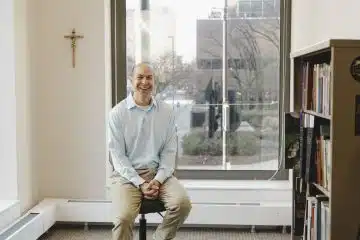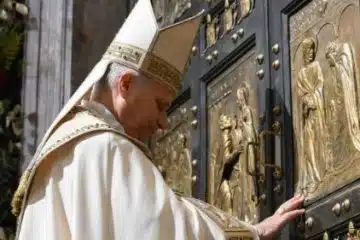Lord’s Day Reflection: The Kingship we still need
By Abbot Marion Nguyen
Today’s Gospel confronts us with one of the most striking contradictions in all of Scripture: a King not seated on a golden throne, but on a cross. From the very first verse, “the rulers sneered at Jesus,” the scene exposes the contrast between human expectations of kingship—power, dominance, control—and the kingship Jesus reveals, which is rooted in self-giving love, sacrifice, and mercy.
On this feast—established by Pope Pius XI nearly one hundred years ago—this Gospel confronts us with the very themes that concerned him in 1925. He instituted the Feast of Christ the King in response to what he perceived as three rising threats to the human soul and human society: secularism, nationalism, and atheism. He saw these forces intensifying after the devastation of the First World War—forces that aimed to push God to the margins of society and enthrone human power, human pride, and human autonomy in God’s place.
A century has passed. Yet is his diagnosis any less relevant today?
We live in a time when the separation of faith from public life is more aggressive than ever. Nations once grounded in shared ideals now retreat into themselves, suspicious of the stranger and resistant toward the immigrant. The sacred is often portrayed as manipulative or oppressive, as though moral truth were a threat to human freedom rather than its foundation. Secularism promises liberation; relativism promises peace and personal fulfilment; transcendental humanism promises progress. Admittedly, these movements often aimed to promote peace, acceptance, and pluralism, but have these movements truly healed the human heart or brought society into greater harmony?
Into this world, Jesus shows us a radically different kingship. His kingdom is not established by force but through suffering love. His rule is not about placing others beneath His feet, but lifting the broken, the forgotten, and the guilty into the embrace of mercy—as we see so vividly when He responded to the repentant thief, “Today, you will be with me in Paradise.”
This is the King who refuses to leave behind even a single soul. The true conquest of Christ is not of territory or power structures; it is the conquest of the human heart. And in all of history, no one has captured the human heart more profoundly, more universally, or more enduringly than Jesus Christ.
If Christ’s kingship challenges nations, it also challenges hearts—ours included: Do we still separate our faith from daily living? Do we continue to support systems—political, social, or personal—that revolve around grabbing power, suppressing opponents, or demanding revenge? Do we, in our own relationships, insist on getting our way, judge others from a place of superiority, or assign blame for our hurts and demand restitution? Or do we truly allow Jesus to be King not only of the universe but of our personal universe?
To claim Christ as King means embracing the cross as the path to transformation: choosing sacrifice for the sake of truth, justice, and righteousness; preferring mercy and forgiveness over resentment and retaliation; recognizing the image of God in every person, especially those who oppose us or whom we find difficult to love. To proclaim Christ as King is to let His way reshape our way, His kingdom reshape our worldview, and His mercy reshape our hearts.













